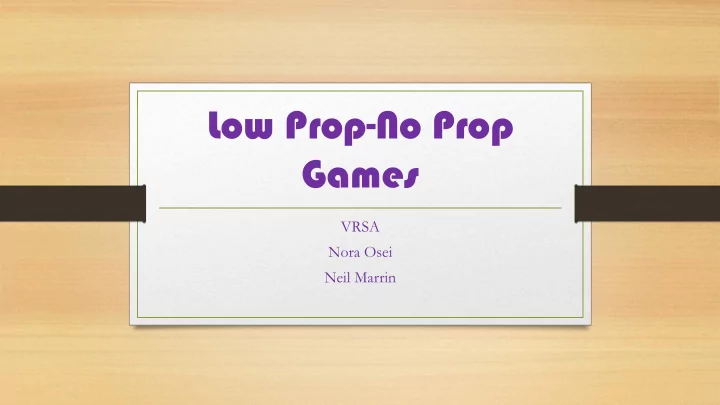

Low Prop-No Prop Games VRSA Nora Osei Neil Marrin
Who we are… • Nora Osei • James Madison University • Graduate Assistant, Sport Clubs and Youth Programs; Marketing Intern
Who we are… • Neil Marrin • James Madison University • Professor and Assistant Director, Hart School of Hospitality, Sport and Recreation Management
Programming with Intentionality • What difference does that make? (Hershey Kisses)
The Importance of Understanding Child Development (programming with Intentionality)-Piaget Theory of Play • “ Are we forming children that are only capable of learning what is already known? Or should we try developing creative and innovative minds, capable of discovery…throughout life” Piaget
Piaget Stages of Development • Sensorimotor • Preoperational • Concrete Operational • Formal Operational
Sensorimotor • Ages: Birth to 18-24 months • Basic Features: Child begins to experiment, learning about the world through trial and error.
Preoperational • Ages: Toddler through age 7 • Basic Features: Child develops memory and imagination. Can engage in make- believe.
Concrete Operational • Ages: 7 – 11 years • Basic Features: Demonstrates logical reasoning.
Formal Operational • Ages: 11 years plus • Basic Features: Can grasp abstract concepts, understand concepts like justice.
Stuart Brown’s Seven Properties of Play 1. Play is Apparently Purposeless 2. Play is Voluntary 3. Play has an Inherent Attraction 4. Play involves a Freedom from Time 5. Play involves Diminished Consciousness of Self 6. Play involves Improvisational Potential 7. Play produces Continuation Desire Information Retried From: http://www.patheos.com/blogs/paperbacktheology/2016/05/dr-stuart-browns-seven-properties-of-play.html
Play is Apparently Purposeless • “Play does not get you food, money or shelter” • It’s purpose is not “immediately apparent” • It only becomes important to us when it is lacking.
Play is Voluntary • “Play has to be entered into freely” • “It cannot be undertaken by compulsion”
Play has an Inherent Attraction • “Play is what feels good, or fun, or stimulating” • “ We naturally want to play”
Play involves a Freedom from Time • In true play experience, “we lose track of time” • “We are present in the moment” • “Time seems to fly”
Play involves Diminished Consciousness of Self • “We stop thinking about the fact that we are thinking” • We no longer need to control or be concerned about what others think about us. “ We stop worrying about what we look like”
Play involves Improvisational Potential • “Play allows us the space to improvise and imagine…” • It allows us to see and feel things differently.
Play produces Continuation Desire • “Play makes us want to keep playing” • We don’t want it to end and try to find excuses not to let it end.
Ten Reasons for Using No/Low Prop Games According to the American Camping Association 1. You’ll never forget your equipment 2. The equipment for these activities can never be lost, stolen, broken, or damaged. 3. You won’t have to spend any money buying gear. 4. You’ll appreciate these activities when you travel with your camp group and have limited room in your luggage or backpack. 5. It won’t matter how many people show up. Because no equipment is required, you’ll be able to accommodate any number of participants! 6. You won’t have to store any equipment after the program. 7. No more last-minute trips to the store to replace a critical piece of equipment that you cannot find. 8. You can begin any time, with little additional preparation, because you don’t need any gear at all. 9. If the weather turns bad, you can quickly move indoors without having tons of gear to relocate. 10. You’ll never be bored, or boring, if you know a few dozen great things to do with nothing at all .
The Importance of Play A pediatrics point of view, Kenneth Ginsburg, MD • “Play is essential to development because it contributes to: • Cognitive, Physical, Social and Emotional Well Being of the Child”
Why the Play Deficit Kenneth Ginsburg, MD • “Parents receive messages that good parenting means actively developing a child’s skill and aptitude” • “The pressure for admission to select schools begins for some families long before college.” • Children are “being passively entertained through television or computer/video games”
Last Lesson • Never think you are too old to: Eat Milk an cookies Read a bed time story Or, Swing on a Swing
Recommend
More recommend